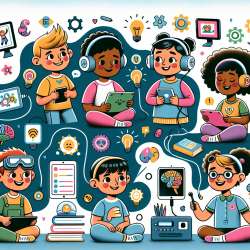As practitioners in the field of speech language pathology, it's crucial to stay abreast of the latest research and integrate data-driven decisions into our practice. The systematic review and meta-analysis titled "Effectiveness of Technology-Based Interventions for School-Age Children With Attention-Deficit/Hyperactivity Disorder: Systematic Review and Meta-Analysis of Randomized Controlled Trials" provides valuable insights into the use of technology to support children with ADHD.
Key Findings from the Research
The meta-analysis included 19 randomized controlled trials (RCTs) involving 1843 participants. The results indicated that technology-based interventions, such as computer-assisted training programs, neurofeedback training, and virtual reality, show promise in improving certain ADHD behaviors and cognitive functions among school-age children.
Significant Outcomes
- Computer-Rated Inattention: Small but significant improvements were observed (SMD -0.35; P<.04).
- Parent-Rated Executive Function: Improvements in overall executive function (SMD -0.35; P<.04).
- Parent-Rated Disruptive Behavior Disorder: Notable reductions in disruptive behaviors (SMD -0.50; P<.001).
- Computer-Rated Visual Attention: Enhanced visual attention (SMD -0.42; P<.001).
Implementing Technology-Based Interventions
Based on these findings, practitioners can consider incorporating technology-based interventions into their therapeutic strategies for children with ADHD. Here are some practical steps:
- Assess the Child's Needs: Determine which specific ADHD behaviors or cognitive functions need improvement.
- Select Appropriate Technology: Choose interventions such as computer-assisted training, neurofeedback, or virtual reality that align with the child's needs.
- Integrate into Therapy: Incorporate these technologies into regular therapy sessions, ensuring they complement existing therapeutic approaches.
- Monitor Progress: Use standardized assessments to track improvements in ADHD behaviors and cognitive functions.
- Adjust as Needed: Based on progress, adjust the intervention to better meet the child's evolving needs.
Encouraging Further Research
While the current research provides a solid foundation, further studies are needed to explore the long-term effects and potential side effects of these interventions. Practitioners are encouraged to contribute to the body of knowledge by conducting and participating in research studies.
Conclusion
Technology-based interventions offer promising avenues for improving outcomes in children with ADHD. By integrating these tools into therapeutic practices, practitioners can enhance their effectiveness and contribute to the overall well-being of children with ADHD.
To read the original research paper, please follow this link: Effectiveness of Technology-Based Interventions for School-Age Children With Attention-Deficit/Hyperactivity Disorder: Systematic Review and Meta-Analysis of Randomized Controlled Trials.










